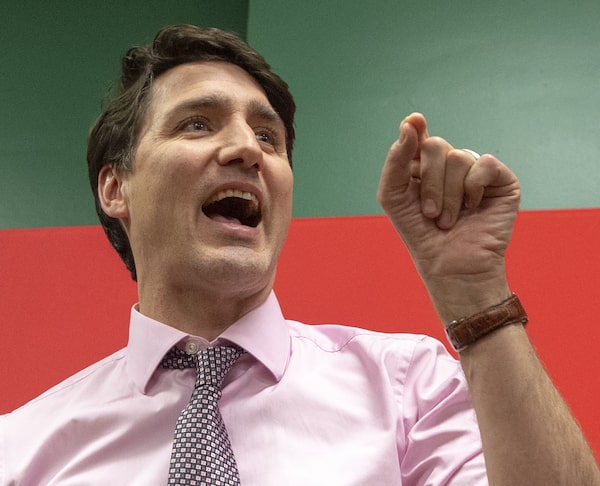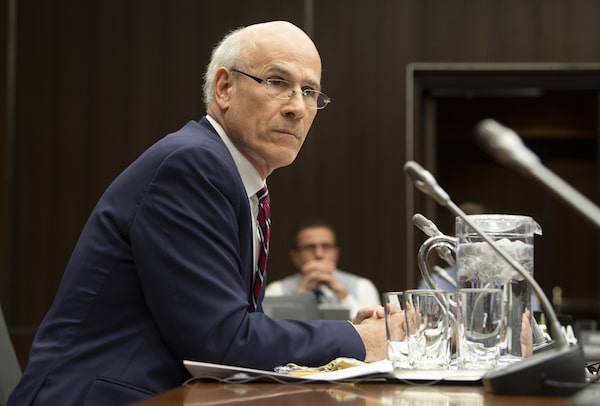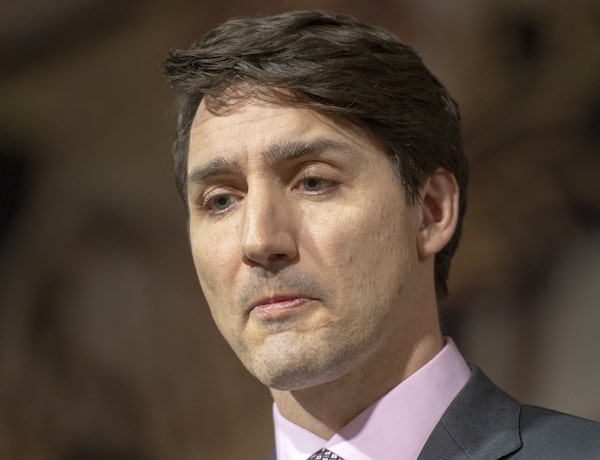Watch Jody Wilson-Raybould's full opening statement from Wednesday's hearing of the House justice committee.
Highlights
- Free to speak for the first time about the SNC-Lavalin affair, Jody Wilson-Raybould delivered dramatic testimony in Ottawa on Wednesday, alleging “inappropriate” and sustained pressure from Prime Minister Justin Trudeau and his office to save the engineering firm from a trial that could damage the Liberals’ political future in Quebec.
- In her lengthy opening statement and three hours of questioning by the House justice committee, she gave a detailed timeline of contentious conversations between her, her staff, the Prime Minister’s Office and other officials. In some of those exchanges, she says she faced “veiled threats” that an SNC trial would allow the firm’s headquarters to leave Quebec, costing thousands of jobs.
- Afterward, Prime Minister Justin Trudeau – who left Ottawa for Montreal shortly before the testimony began – faced calls from the opposition to resign or face a public inquiry. On Thursday, Conservative Leader Andrew Scheer wrote to RCMP Commissioner Brenda Lucki asking for an investigation, citing a provision of the Criminal Code making it illegal to “provoke a state of fear” to impede the criminal justice system.
- Mr. Trudeau said Wednesday that he “completely disagreed” with Ms. Wilson-Raybould’s version of events and denied any wrongdoing. Asked about the issue again on Thursday, Mr. Trudeau said neither he nor the RCMP had contacted him about SNC.
What we knew before Wednesday

The headquarters of SNC-Lavalin in Montreal.Paul Chiasson/The Canadian Press
On Feb. 7, The Globe and Mail reported for the first time that Jody Wilson-Raybould had faced pressure in her previous job as justice minister to intervene in the federal corruption case against SNC-Lavalin, a Quebec engineering firm accused of bribing Libyan officials to win construction contracts. That first Globe report was based on information from confidential sources, who said the Prime Minister’s Office sought to avoid a costly trial last fall by reaching an out-of-court settlement with SNC. But Ms. Wilson-Raybould refused. Months later, she was shuffled into the Veterans Affairs portfolio.
Prime Minister Justin Trudeau denied he had “directed” Ms. Wilson-Raybould on the matter, but dodged questions on whether he had pressed her. He later acknowledged that they had discussed SNC’s case, and that when she asked in September whether he was ordering her to make a particular decision, he told her no. But Ms. Wilson-Raybould, who quit as veterans minister on Feb. 12, didn’t have a chance to tell her side of the story because she said she was bound by solicitor-client privilege. Mr. Trudeau partly waived that privilege on Feb. 25, but only for matters relating to her time as justice minister. That set the stage for Wednesday’s hearings at the House justice committee, which is looking into the SNC issue in general.
Explainer: The full story so far of SNC-Lavalin, Jody Wilson-Raybould and Trudeau’s PMO
Explainer: What are the PMO and PCO, and what do they do?
Explainer: When does The Globe use anonymous sources?
‘Veiled threats’ to 'politically interfere’

Prime Minister Justin Trudeau speaks to supporters in Montreal on Feb. 27, 2019.Ryan Remiorz/The Canadian Press
In her opening statement, which ran more than 5,000 words, Ms. Wilson-Raybould described “consistent and sustained” political pressure from Mr. Trudeau and top officials urging her to settle the SNC case quietly by urging the Director of Public Prosecutions to reach a deferred prosecution agreement, or DPA, so that SNC could admit wrongdoing and pay compensation without a more costly trial:
For a period of approximately four months between September and December 2018, I experienced a consistent and sustained effort by many people within the government to seek to politically interfere in the exercise of prosecutorial discretion in my role as the Attorney General of Canada in an inappropriate effort to secure a Deferred Prosecution Agreement with SNC-Lavalin. These events involved 11 people (excluding myself and my political staff) – from the Prime Minister’s Office, the Privy Council Office, and the Office of the Minister of Finance.
On several occasions, she says, “veiled threats” were invoked that SNC would move its head office out of Quebec if its legal woes continued, losing thousands of jobs in the province. She cited several times when Mr. Trudeau or other officials brought up the then-upcoming Quebec provincial election, which the provincial Liberals ultimately lost on Oct. 1 to the Coalition Avenir Québec.
Here’s what she said about one such meeting, where she spoke with Mr. Trudeau and Michael Wernick, Clerk of the Privy Council, on Sept. 17. At this point, the Director of Public Prosecutions had already informed SNC that there would be no DPA, according to court documents obtained by The Globe:
The Prime Minister asks me to help out – to find a solution here for SNC – citing that if there was no DPA there would be many jobs lost and that SNC will move from Montreal. In response, I explained to him the law ... I told him that I had done my due diligence and made up my mind on SNC and that I was not going to interfere with the decision of the DPP.
... At that point the PM jumped in stressing that there is an election in Quebec and that “and I am an MP in Quebec – the member for Papineau.” My response – and I remember this vividly – was to ask the PM a direct question while looking him in the eye – I asked: “Are you politically interfering with my role / my decision as the AG? I would strongly advise against it.” The Prime Minister said “No, No, No – we just need to find a solution.”
The names named
Michael Wernick

Clerk of the Privy Council Michael Wernick waits to appear before the House justice committee on Feb. 21, 2019.Adrian Wyld/The Canadian Press
Michael Wernick is head of the Privy Council Office, a wing of the public service that supports the PMO and cabinet. He was present at Ms. Wilson-Raybould’s Sept. 17 meeting with Mr. Trudeau. She describes him supporting Mr. Trudeau’s argument that job losses in Quebec were a sufficient reason to intervene in the SNC case:
Then to my surprise – the Clerk started to make the case for the need to have a DPA – he said “there is a board meeting on Thursday (Sept 20) with stock holders” ... “they will likely be moving to London if this happens” ... “and there is an election in Quebec soon” ...
On Dec. 19, after more conversations between Mr. Wernick and her staff, Ms. Wilson-Raybould had a phone call with him:
The Clerk said that the PM is quite determined, quite firm but he wants to know why the DPA route which Parliament provided for isn’t being used. He said “I think he is gonna find a way to get it done one way or another. So, he is in that kinda mood and I wanted you to be aware of that.”
I warned the Clerk that we were treading on dangerous ground here – and I issued a stern warning because as the AG, I cannot act in a manner and the prosecution cannot act in a manner that is not objective, that isn’t independent, I cannot act in a partisan way and I cannot be politically motivated. And all of this screams of that.
Gerald Butts and Katie Telford
Mr. Trudeau's chief of staff Katie Telford and principal secretary Gerald Butts speak before a cabinet shuffle at Rideau Hall on July 18, 2018.CHRIS WATTIE/Reuters
Gerald Butts, the Prime Minister’s best friend, spent more than three years at his side as principal secretary. But on Feb. 18 he quit, saying the accusations of PMO meddling were a distraction from the government’s work. That left Katie Telford, Mr. Trudeau’s chief of staff, as the most senior person in the PMO.
In her testimony, Ms. Wilson-Raybould described both of them playing a key role in the SNC discussions. On Dec. 18, she says he challenged her chief of staff, Jessica Prince, to get an external legal opinion of the DPP’s decision not to reach a DPA:
Gerry said “Jess, there is no solution here that doesn’t involve some interference.” At least they are finally being honest about what they are asking you to do! Don’t care about the PPSC’s independence. Katie was like “we don’t want to debate legalities anymore.” … They kept being like “we aren’t lawyers, but there has to be some solution here”.’
Bill Morneau

Minister of Finance Bill Morneau stands during Question Period on Feb. 5, 2019.Sean Kilpatrick/The Canadian Press
Ms. Wilson-Raybould’s testimony also added some new characters to the SNC drama: Bill Morneau, the Finance Minister, and his chief of staff Ben Chin. Ms. Prince talked with Mr. Chin on Sept. 6, two days after SNC was notified there would be no DPA. He, too, pressed on the issue of jobs and the Quebec election:
He wanted to talk about SNC and what we could do, if anything, to address this. He said to her that if they don’t get a DPA, they will leave Montreal, and it’s the Quebec election right now, so we can’t have that happen. He said that they have a big meeting coming up on Tuesday and that this bad news may go public.
David Lametti

Justice Minister David Lametti responds to a question in the House of Commons on Feb. 26, 2019.Adrian Wyld/The Canadian Press
When Ms. Wilson-Raybould was shuffled out of her job in January, Mr. Trudeau chose MP David Lametti to replace her as justice minister. Days before the shuffle, discussions were set in motion to make the SNC file a priority for Mr. Lametti, Ms. Wilson-Raybould said, citing directives given to the deputy justice minister by Mr. Wernick:
My former Deputy Minister is called by the Clerk and told that the shuffle is happening, and that she will be getting a new Minister. As part of this conversation, the Clerk tells the Deputy that one of the first conversations that the new Minister will be expected to have with the PM will be on SNC Lavalin. In other words, that the new Minister will need to be prepared to speak to the PM on this file. The Deputy recounts this to my Chief of Staff who tells me about the comment.
The spectre of Nixon
U.S. president Richard Nixon, shown in March, 1973.Charles Tasnadi/The Associated Press
One of the biggest corruption scandals in U.S. history, Watergate, got an unexpected cameo in Wednesday’s hearings when Ms. Wilson-Raybould mentioned the Saturday Night Massacre, when president Richard Nixon’s attorney-general quit in 1973 rather than fire the Watergate special prosecutor. She brought up the comparison in her Dec. 19 conversation with Mr. Wernick, when he pressed her again on reaching a settlement with SNC:
The Clerk acknowledged that, but said that the PM does not have the power to do what he wants… all the tools are in my hands, he said. I said that I was having thoughts of the Saturday Night Massacre – but that I was confident that I had given the Prime Minister my best advice to protect him and to protect the constitutional principle of prosecutorial independence. The Clerk said that he was worried about a collision because the PM is pretty firm about this…He told me that he had seen the PM a few hours ago and that this is really important to him.
Here’s a primer from The Globe’s Washington correspondent, Adrian Morrow, on the legacy of Mr. Nixon’s Saturday Night Massacre.
What wasn’t said
Ms. Wilson-Raybould prepares to testify on Feb. 27, 2019.Blair Gable/The Globe and Mail
For all her candour on Wednesday, Ms. Wilson-Raybould’s reprieve from solicitor-client privilege only went so far. Mr. Trudeau’s order-in-council only covered her time as justice minister, so her timeline of events ends with her exit from the job. Ahead of her testimony, she wrote to the justice committee’s chair, Anthony Housefather, saying she was disappointed that she couldn’t address events after that:
[The order-in-council] addresses only my time as attorney-general of Canada and therefore does nothing to release me from any restrictions that apply to communications while I served as minister of veterans affairs and in relation to my resignation from that post or my presentation to cabinet after I had resigned.
How Trudeau responded

Mr. Trudeau speaks at a media availability in Montreal on Feb. 27, 2019.Ryan Remiorz/The Canadian Press
Mr. Trudeau wasn’t in Ottawa during Ms. Wilson-Raybould’s committee hearing, instead going to Montreal soon after an appearance in Question Period. Afterward, Mr. Trudeau told a late news conference that he “completely disagreed” with Ms. Wilson-Raybould’s version of events, that neither he nor his staff had done anything wrong and that he had faith in an investigation of the matter by the Ethics Commissioner. Asked if he would resign, he said Canadians would get a choice in October’s federal election about who should lead the nation.
How the opposition responded
After Wednesday’s hearing, Conservative Leader Andrew Scheer said Mr. Trudeau had lost moral authority to govern and should step down. On Thursday he wrote to the head of the RCMP asking for an investigation. Meanwhile, NDP Leader Jagmeet Singh called for a public inquiry and condemned the Prime Minister for appearing to side with “rich corporations who need favours.”
Justin Trudeau simply cannot continue to govern this great nation now that Canadians know what he has done. That is why I am calling on Justin Trudeau to resign. My statement: https://t.co/FkMT8l8ave pic.twitter.com/lqy6nq1TkU
— Andrew Scheer (@AndrewScheer) February 28, 2019
After the alarming testimony from former Justice Minister Jody Wilson-Raybould, it's absolutely clear now that we need a public inquiry into PM Trudeau's #SNCLavalin scandal.
— NDP (@NDP) February 27, 2019
Add your name now & demand answers from this Liberal government: #cdnpoli https://t.co/hiXesdFT5O
How Indigenous people responded

Grand Chief Stewart Phillip, president of the Union of British Columbia Indian Chiefs, sits beside UBCIC vice-president Chief Bob Chamberlin at a Vancouver news conference on Feb. 22.DARRYL DYCK/The Canadian Press
Ms. Wilson-Raybould – whose traditional name, Puglaas, means “a woman born to noble people” in the Kwak’wala language – is descended from the Musgamagw Tsawataineuk and Laich-Kwil-Tach peoples of British Columbia. When she got the justice minister job in 2015, she was the first Indigenous woman to hold the post, and identified with a traditional role – Hiligaxste, or One Who Corrects the Chiefs’ Path – in her career as a lawyer and politician. She acknowledged that cultural heritage again in the conclusion to her Wednesday testimony:
I come from a long line of matriarchs and I am a truth teller in accordance with the laws and traditions of our Big House – this is who I am and who I will always be. Gilakas’la / Thank you.
Afterward, Indigenous leaders across the country expressed support for her and anger at the Trudeau government. Here’s what Grand Chief Stewart Phillip of the Union of B.C. Indian Chiefs said:
It makes one more angry about how terribly she was treated, how she was coerced, how she was browbeaten. But at the same time, we’re elated that she’s been vindicated and has had an opportunity to speak her truth.
Commentary and analysis
Editorial: Jody Wilson-Raybould’s accusation goes to the very heart of Canadian justice
Elizabeth Renzetti: When Jody Wilson-Raybould’s truth finally came, it was quiet – and devastating
John Ibbitson: Trudeau has lost the moral mandate to govern
Campbell Clark: Wilson-Raybould’s testimony makes it hard to believe in Trudeau’s good intentions
Compiled by Globe staff
With reports from Robert Fife, Steven Chase, Michelle Zilio, Janice Dickson, Daniel Leblanc, Bill Curry, Sean Fine, Jeffrey Jones, Barrie McKenna, Shelby Blackley, Kathryn Blaze Baum and Adrian Morrow